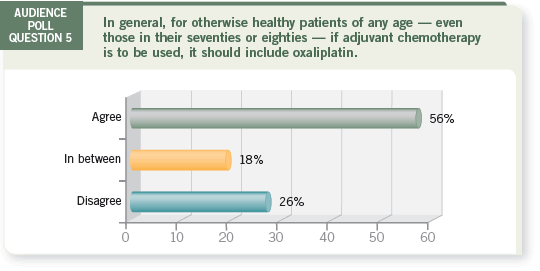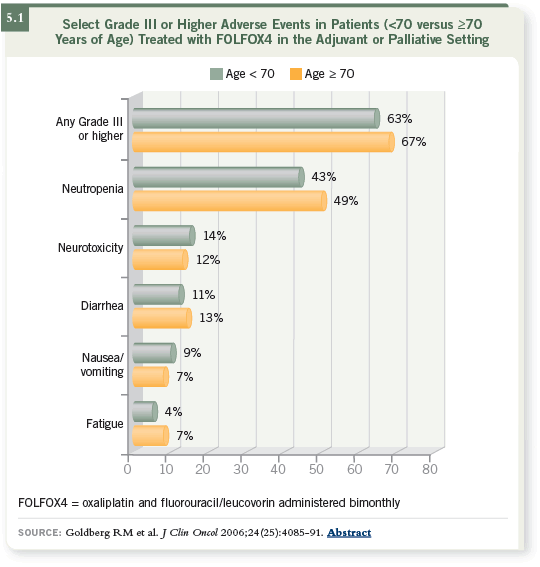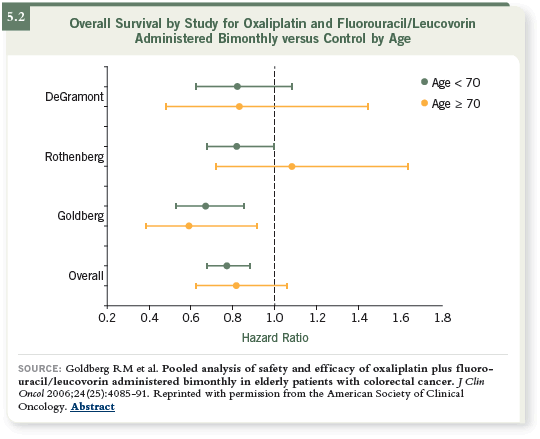
| Tracks 1-4 |
| Track 1 |
Selection and use of adjuvant chemotherapy for older patients |
| Track 2 |
Chemotherapy tolerance in octogenarians |
|
| Track 3 |
Case discussion: A 92-year-old with T3N2 (10 positive nodes) colon cancer |
| Track 4 |
FOLFOX versus FLOX in the adjuvant treatment of older patients with colorectal cancer |
|
|

Track 1
 DR LOVE:
DR LOVE: Rich, what are your thoughts on the audience response to this
question?
 DR GOLDBERG: I am surprised that about one quarter of the participants
in the audience are not offering FOLFOX to older patients in the adjuvant
setting. I believe the data suggest that as long as you pick your patients
carefully, the vast majority can tolerate more aggressive therapy (Goldberg
2006; [5.1]).
DR GOLDBERG: I am surprised that about one quarter of the participants
in the audience are not offering FOLFOX to older patients in the adjuvant
setting. I believe the data suggest that as long as you pick your patients
carefully, the vast majority can tolerate more aggressive therapy (Goldberg
2006; [5.1]).

 DR LOVE: A physician in the audience has submitted a case to you to discuss
— a 92-year-old man with 10 positive nodes.
DR LOVE: A physician in the audience has submitted a case to you to discuss
— a 92-year-old man with 10 positive nodes.
 DR GOLDBERG: I would consider the person with 10 positive nodes as
someone who is exceedingly unlikely to be cured by surgery either alone or with adjuvant therapy. If you look at the Gill Model we constructed and
published in the Journal of Clinical Oncology, for a patient with more than four
positive nodes, the five-year survival was around 10 percent without adjuvant
therapy and about 25 percent with adjuvant therapy (Gill 2004).
DR GOLDBERG: I would consider the person with 10 positive nodes as
someone who is exceedingly unlikely to be cured by surgery either alone or with adjuvant therapy. If you look at the Gill Model we constructed and
published in the Journal of Clinical Oncology, for a patient with more than four
positive nodes, the five-year survival was around 10 percent without adjuvant
therapy and about 25 percent with adjuvant therapy (Gill 2004).
Percentage for percentage, patients with the highest risk of recurrence
benefited the most from 5-FU/leucovorin (Gill 2004). Presumably, if you
were to use FOLFOX, the benefit of adjuvant chemotherapy would be
magnified.
According to the data published by Dan Sargent and the ACCENT
(Adjuvant Colon Cancer Endpoints) Group, we know that colorectal cancer
tends to recur early, with about 80 percent of the recurrences occurring in
the first three years (Sargent 2005).

In somebody with an aggressive tumor like the one you mentioned, I would
expect a recurrence earlier rather than later. If the person is otherwise fit, I
believe the judicious use of chemotherapy is appropriate.
In my own practice, if I’m concerned about the patient tolerating therapy,
I’ll often use infusional 5-FU/leucovorin without a bolus for the first cycle.
If they tolerate it, which most of them do, then I’ll add oxaliplatin. I would
rather experiment and be more aggressive with these patients than use single-agent
therapy.
 DR LOVE: Do you hear any other questions from physicians who treat
colorectal cancer about the use of adjuvant chemotherapy in elderly patients?
DR LOVE: Do you hear any other questions from physicians who treat
colorectal cancer about the use of adjuvant chemotherapy in elderly patients?
 DR GOLDBERG: One of the questions I’m asked is, “What about the use of
oxaliplatin for the patient who is older and has diabetes?” My feeling is that in
most patients the neurologic toxicity associated with oxaliplatin is not an on-off
switch — it’s something that is “dialed up” over time.
DR GOLDBERG: One of the questions I’m asked is, “What about the use of
oxaliplatin for the patient who is older and has diabetes?” My feeling is that in
most patients the neurologic toxicity associated with oxaliplatin is not an on-off
switch — it’s something that is “dialed up” over time.
As long as you’re attentive and talk to patients about it, I believe you can safely
use oxaliplatin for people with a risk of sensory neuropathy. You simply have
to lower your threshold for backing off from the drug.
Track 2
 DR LOVE:
DR LOVE: What are your thoughts on treating octogenarians with
chemotherapy?
 DR GOLDBERG: Patients in their eighties are vastly underrepresented in
clinical trials, so we don’t have many objective data to rely on. Rather, we’re
extrapolating from people in their seventies.
DR GOLDBERG: Patients in their eighties are vastly underrepresented in
clinical trials, so we don’t have many objective data to rely on. Rather, we’re
extrapolating from people in their seventies.
Having said that, I have a patient in my practice who’s 91 years old that I
treated with FOLFOX and bevacizumab. When she came in to my office with
a walker due to arthritis, someone could have criticized my treatment choice,
but I kept a low threshold for discontinuing the therapy, and she tolerated it
just fine.
 DR LOVE: Alan, we see in Adjuvant Online! that as the patient’s age increases,
the absolute benefit of adjuvant therapy decreases because of competing causes
of mortality. What are your thoughts about this issue?
DR LOVE: Alan, we see in Adjuvant Online! that as the patient’s age increases,
the absolute benefit of adjuvant therapy decreases because of competing causes
of mortality. What are your thoughts about this issue?
 DR VENOOK: Age is a factor in your decision-making and in how aggressively
you follow patients. However, age by itself should not be a reason not to offer
patients treatment (5.2). One problem with the clinical trials is that we get our
trial data on 80-year-old Olympic athletes, and whether that’s relevant to the
patient in your office is a different question.
DR VENOOK: Age is a factor in your decision-making and in how aggressively
you follow patients. However, age by itself should not be a reason not to offer
patients treatment (5.2). One problem with the clinical trials is that we get our
trial data on 80-year-old Olympic athletes, and whether that’s relevant to the
patient in your office is a different question.
Track 4
 DR LOVE:
DR LOVE: Norm, what about FLOX versus FOLFOX in the elderly?
 DR WOLMARK: I would stick to the regimen that has been demonstrated
to be effective, regardless of age, and I believe more data are available with FOLFOX than with FLOX.
DR WOLMARK: I would stick to the regimen that has been demonstrated
to be effective, regardless of age, and I believe more data are available with FOLFOX than with FLOX.
 DR GROTHEY: The NSABP-C-07 FLOX data added nicely to the oxaliplatin
story in the sense that we have learned that regardless of the 5-FU backbone
— whether it’s bolus or infusional — oxaliplatin adds benefit in the adjuvant
setting, whereas the irinotecan story turned the other way. We hope to see
that soon with capecitabine, but we don’t know that yet.
DR GROTHEY: The NSABP-C-07 FLOX data added nicely to the oxaliplatin
story in the sense that we have learned that regardless of the 5-FU backbone
— whether it’s bolus or infusional — oxaliplatin adds benefit in the adjuvant
setting, whereas the irinotecan story turned the other way. We hope to see
that soon with capecitabine, but we don’t know that yet.
Select Publications

